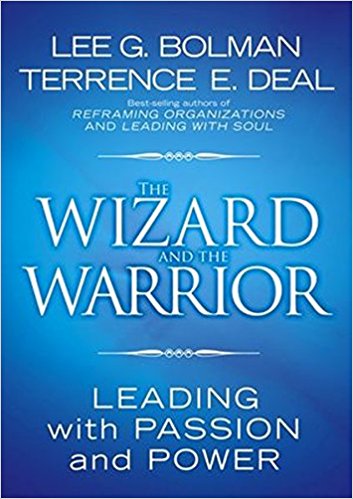The Wizard and the Warrior Summary
5 min read ⌚
 Leading with Passion and Power
Leading with Passion and Power
Everyone wishes for the working environment to be a place populated with rational, calm individuals who make legitimate, astute choices without getting emotional or aggressive.
Who Should Read “The Wizard and the Warrior”? And Why?
The “The Wizard and the Warrior” is a practical and nicely written guide, that consists of recommendations on understanding the elements in the work environment, and using that knowledge to emerge as a great leader.
This book’s insight and astuteness are based on real cases and realistic experiences of amazing leaders from humankind’s history.
Authors Lee G. Bolman and Terrence E. Deal do an excellent job in populating the already saturated pool of books about business leadership with a fresh “package” of the topic. We heartedly recommend this book to all potential or current leaders who are willing to develop their leadership skills and style.
About Lee G. Bolman & Terrence E. Deal
 Lee G. Bolman is a professor at the University of Missouri – Kansas City.
Lee G. Bolman is a professor at the University of Missouri – Kansas City.
Terrence E.Deal is a retired professor from the University of Southern California. They have co-authored Reframing Organizations and Leading with Soul.
“The Wizard and the Warrior Summary”
This kind of hypothetical situation exists in the psyches of many supervisors as well. They either don’t recognize the truth of office legislative issues, or they refuse to take part in a dynamic they see as entirely disagreeable.
They trust that everybody will always play fair, and they would instead maintain a distance from conflicts and unwanted circumstances. Unfortunately, this philosophy is bound to fail. This is so because, in any association, pioneers and chiefs need conviction, reason, and strength to be able to use their capability to influence change.
The closest to perfect governing style links the best characteristics of the wizard and the warrior styles. The wizard takes care of issues with a big-hearted, patient approach, utilizing intelligence, knowledge, and persuasion.
The warrior, on the other hand, depends on strength, crude bravery, steely nerves and a win-no matter what demeanor. Numerous directors and representatives are terrified by the warrior mindset and mystified by the wizard.
History’s most skilled and memorable leaders have walked the line stretched between the two universes. Abraham Lincoln, a splendid man, and persuasive speaker conceded that it was difficult for him to detest his enemies, and he disdained war conflict.
Sadly, however, his conviction that slavery was not to be accepted pushed the U.S. into a bloody battle. Martin Luther King Jr. liked to make progress in the field of human rights through peaceful negotiations and resolutions.
However, not everything went smoothly – he was physically assaulted and got imprisoned. These were powerful strategies, yet they required remarkable fearlessness.
Amazing leaders are both pragmatists and visionaries, both intuitive and strategic. They fight for their values and opinions. The individuals who find conflicts difficult get into the circles of people who do not mind battle. Others transform their heart into a warrior’s one through their own experiences.
Frequently, inspiring anecdotes and stories indicate all the things that a blend of a wizard and a warrior soul can achieve. Differentiate the “ninja and the samurai” to help you imagine. The ninja depended on mystery and stealth, while the samurai utilized battle and physical strength.
The ninja had some dose of power, and the samurai had a touch of magic. Connecting with your warrior side is somewhat less demanding compared to relating to the wizard.
First, figuring out how to fight is hard for many people, and tackling the power of magic additionally complicates the things. The appropriate response, as Dorothy found in The Wizard of Oz, is to walk on the correct road: Don’t delay or hesitate.
Make the first strides in your voyage, while utilizing the warrior’s sword, and the wizard’s wand to build your brains, heart, and bravery.
Key Lessons from “The Wizzard and the Warrior”
1. Warrior Roles
2. Wizard Roles
3. Leading the Way
Warrior Roles
“Toxic Warriors” are in constant conflict with their inner demons. They possess hypnotic personalities, and captivate people, by both intriguing them and repelling them. Most of the time they consider everyone around them inferior, couldn’t care less about other people, their opinions, and their criticism.
They find themselves to be perfect and justify their actions as needed to fix the issues at hand. Their primary concern is making the organization more profitable, regardless of whether through intimidation or control.
“Relentless Warriors” are always headed to success.
These people are driven by an ethical code that forbids them from taking part in the profound destruction of other individuals. Relentless warriors often create business empires, are difficult to knock off track, even in cases when they are set out only toward trouble, and the battle no longer makes sense.
“Principled Warriors” are eager to fight until death when they care about a cause. In some occasions, they appear to be excessively pleasant, making it impossible to take part in the fights necessary to win their wars.
Principled warriors have valor and duty, and they do not abuse control. They relentlessly seek after the triumph and they win more than they fall flat. They are history makers.
Wizard Roles
“Authentic Wizards” know how to make other accompany them on their journeys by their uplifting worldview, enthusiasm, and influential personalities. Authentic wizards, regardless of whether they are business leaders or influential legislators, are savvy individuals who move into circles made of other brilliant, dynamic people.
They are very principled, treat their workers and clients right, support inventions and advancement, and always search for opportunities to improve.
“Wannabe Wizards” are equipped with high expectations and noble yearnings, but their optimistic plans are always ambushed by conventional values that rule the society. In the end, the wannabe wizard finds that their thoughts can rarely (if ever) transform into reality.
“Harmful Wizards” are selfish, do not possess a moral compass, cultivate evil thoughts and intentions and are selfish by all means. Most of the time they are occupied with sketchy, exploitative and even illicit business.
Leading the Way
Best leaders are a combination of the attributes of the warrior and the wizard.
They possess a healthy value system, are enthusiastic, decisive and uplifting. They take risks and maybe even break the rules now and then, but they know what outcomes they can expect and know how to manage them.
Like this summary? We’d Like to invite you to download our free 12 min app, for more amazing summaries and audiobooks.
“The Wizard and the Warrior” Quotes
It takes courage and faith to set the pace because showing the way is inherently dangerous. Share on X It takes courage and faith to set the pace because showing the way is inherently dangerous. Share on X It takes courage and faith to set the pace because showing the way is inherently dangerous. Share on X In our own relentless search for wizards, we overlook a prime source - our own souls. Share on X Though the potentials for wizard and warrior coexist in all of us, our gifts differ, and some of us are more determined than others to develop and use the gifts we have. Share on XEmir is the Head of Marketing at 12min. In his spare time, he loves to meditate and play soccer.


 Leading with Passion and Power
Leading with Passion and Power




